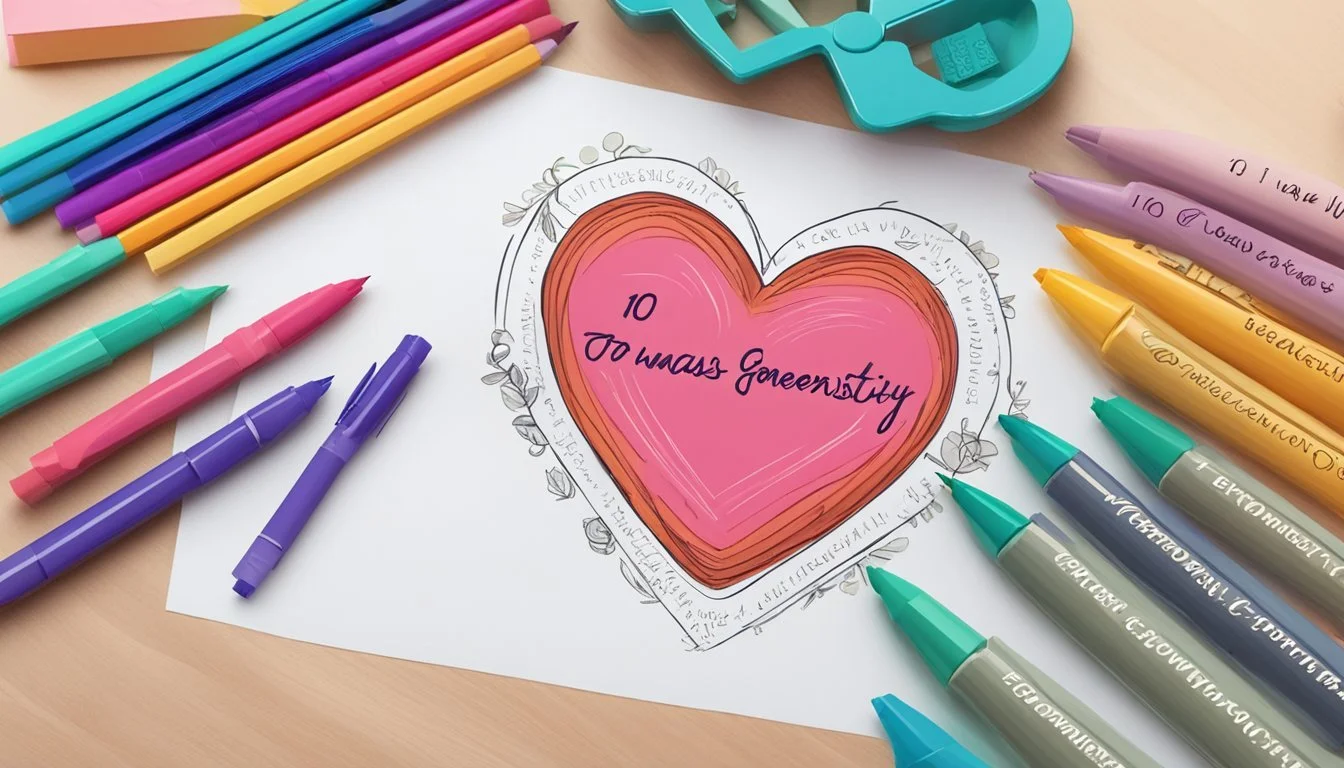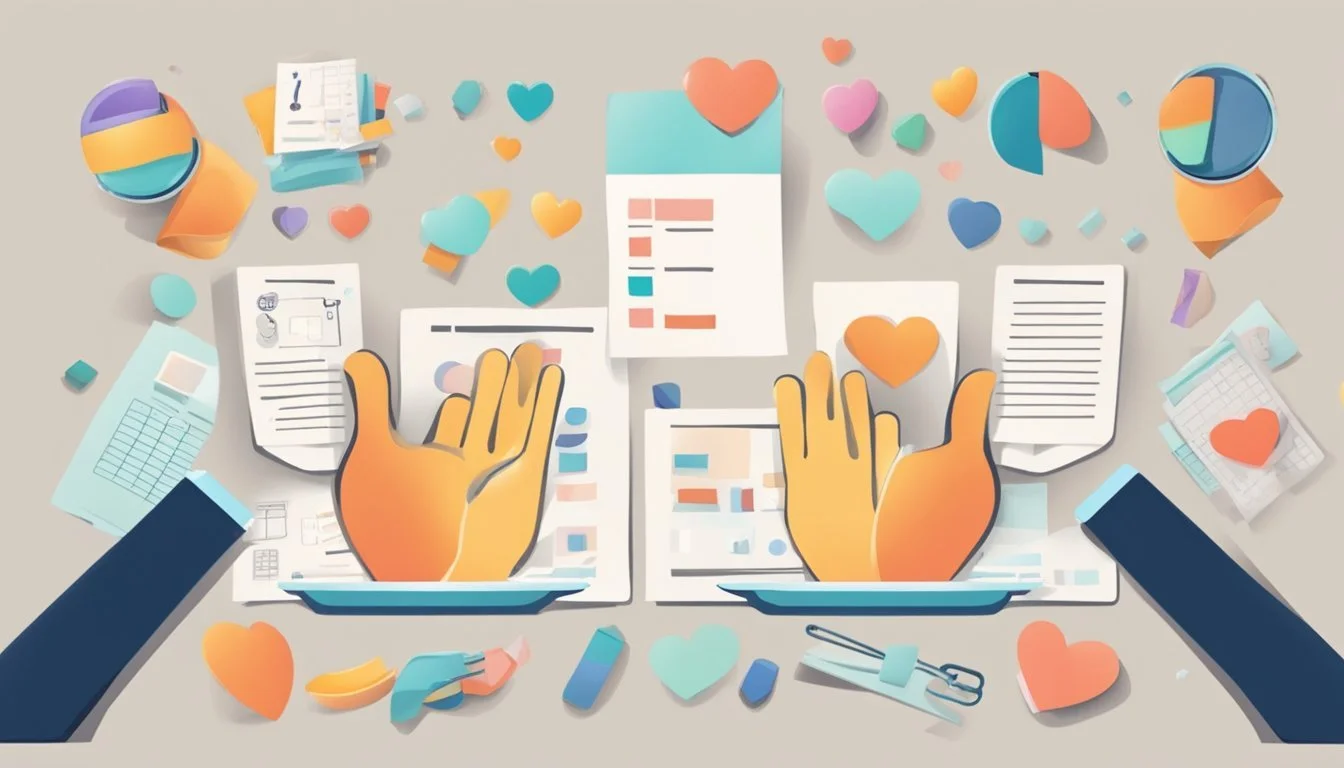10 Ways to Practice Emotional Generosity with Your Partner for a Stronger Relationship
Cultivating emotional generosity in a relationship can significantly enhance the bond between partners. By focusing on small acts of kindness, empathy, and emotional support, couples can build a foundation of trust and compassion. Understanding the importance of emotional generosity is crucial for fostering a fulfilling and lasting partnership.
Emotional generosity involves consistently putting effort into making your partner feel valued and understood. Simple gestures and genuine expressions of love can go a long way in strengthening the connection. This article will explore various ways to incorporate emotional generosity into your daily interactions, helping to create a more harmonious and supportive relationship.
1) Share Compliments Daily
Offering compliments regularly can significantly enhance emotional connection in a relationship. Compliments build a positive atmosphere, making your partner feel valued and appreciated. Authenticity is crucial; genuine compliments resonate more and reinforce trust and affection.
Recognize your partner’s efforts and qualities daily. Acknowledge their achievements, no matter how small. This practice can boost their confidence and reinforce their sense of self-worth.
Specificity in compliments adds depth. Instead of a generic "You look nice," say something like, "Your smile brightens my day." This kind of specificity shows attentiveness and genuine interest.
Encouraging a habit of sharing compliments can cultivate an environment of mutual respect and admiration in the relationship. By focusing on positivity, partners can foster a deeper emotional bond and a more fulfilling connection.
2) Listen Actively Without Interrupting
Active listening is essential for effective communication with your partner. It involves giving undivided attention, maintaining eye contact, and avoiding distractions. When your partner speaks, they should feel heard and understood.
Avoid interrupting or finishing their sentences. This demonstrates respect and allows them to express their thoughts fully. Couples often feel more connected when they can share without fear of being cut off.
Active listening also means refraining from passing judgment. Receiving your partner’s words with an open mind encourages a more honest and deep exchange of feelings. This openness fosters trust and strengthens the relationship.
Using non-verbal cues, such as nodding, can show that you are engaged. This non-verbal communication reinforces that you are attentive and valuing what your partner is saying.
To practice active listening, focus on your partner's words and reflect on their meaning before responding. This deliberate consideration shows empathy and understanding, which are crucial components of active listening.
By committing to active listening, couples can resolve conflicts more effectively. It helps in reducing misunderstandings and contributes to a more harmonious relationship.
Listening without interrupting not only improves communication but also strengthens the emotional bond between partners. Employing this technique consistently can lead to a deeper, more supportive connection.
3) Give Undivided Attention During Conversations
Giving undivided attention during conversations is crucial for emotional generosity. When a partner speaks, they should feel heard and valued. To achieve this, put away distractions such as phones and laptops. Face-to-face interaction enhances connection.
Non-verbal cues demonstrate active listening. Nod occasionally and maintain eye contact. Simple gestures show that the listener is fully engaged in the conversation.
Creating a conducive environment is also essential. Choose quiet settings for discussions. This minimizes disruptions and allows for a more meaningful exchange. A calm environment helps both partners to focus solely on each other.
Interruptions can break the flow of communication. Let the speaker finish their thoughts before responding. Waiting patiently fosters respect and understanding. This approach strengthens the bond between partners.
Lastly, be mindful of your presence. Actions like closing your laptop or turning off the TV, even if muted, can significantly boost the sense of attention. Little actions, such as these, signal to your partner that they are your priority.
Consistency in giving full attention nurtures trust and respect within the relationship. Prioritizing quality time in conversations highlights the importance of the partner’s feelings and thoughts.
4) Surprise Them with Thoughtful Gestures
Surprising your partner with thoughtful gestures can significantly enhance your emotional connection. These gestures don't have to be extravagant; it's the intention behind them that matters.
One idea is to plan a surprise picnic. Pack their favorite snacks, a cozy blanket, and head to a scenic spot. This can make for a memorable and cherished outing.
You could also customize a puzzle using a meaningful photo. This gesture combines creativity with sentimentality, providing a unique way to revisit shared memories.
Another simple yet impactful act is to leave a heartfelt note for your partner. Place it somewhere they'll find it unexpectedly, like in their bag or on the bathroom mirror.
Performing daily acts of kindness, like cooking their favorite meal or handling a chore they dislike, can also show your attentiveness and care.
Consider giving a spontaneous compliment. Genuine praise can uplift their mood and reaffirm your appreciation for them.
These small yet meaningful surprises can strengthen your relationship by showing that you value and think of your partner in thoughtful ways.
To explore more ideas, check out 80 Sweet Romantic Gestures To Make Their Day and 30 Extremely Easy Ways To Be A More Generous Partner.
5) Express Genuine Gratitude
Expressing genuine gratitude is a powerful way to foster a deeper connection with your partner. Words are a straightforward method to convey appreciation. A simple "thank you" can go a long way. Verbal expressions of gratitude might seem small, but they can significantly enhance your partner’s sense of being valued.
Sometimes, face-to-face acknowledgment is the most impactful. When in person, take a moment to look your partner in the eye and express your gratitude sincerely. This shows that you are fully present and truly appreciate their efforts. If you're apart, a heartfelt phone call can also make a strong impression.
Gratitude doesn't always have to be verbal. Writing a thoughtful note or leaving a small surprise can also be meaningful. These gestures can brighten your partner’s day and remind them of how much they mean to you. Expressing appreciation through different means keeps things fresh and signifies consistent recognition of their efforts.
Additionally, acknowledging small acts can be just as important as recognizing larger actions. Thank your partner for the everyday things they do, such as preparing a meal or doing chores. This practice reinforces the culture of appreciation and kindness within the relationship.
Practicing gratitude regularly can cultivate a more positive environment. It encourages both partners to continue making efforts for each other and strengthens the emotional bond.
To explore more ways to show appreciation, consider reading about 19 examples & ideas to express gratitude. Incorporating these practices into your relationship can enhance mutual respect and love.
6) Respect Their Personal Space
Respecting personal space is a crucial aspect of emotional generosity. Each individual requires their own time and space to relax and engage in activities they enjoy. Acknowledging this need without taking it personally fosters a healthy relationship dynamic.
Encouraging your partner to pursue individual hobbies and interests can strengthen your bond. Allowing space for solitude enables them to recharge and maintain their mental well-being.
Effective communication plays a key role. Expressing understanding and support when they need time alone shows respect and contributes to a stronger connection.
Building trust involves honoring boundaries. When personal space is respected, it enhances feelings of safety and comfort in the relationship. This practice lays the foundation for mutual respect and emotional closeness.
For more insights, consider exploring ways to maintain personal space in relationships.
7) Write a Heartfelt Note or Letter
Writing a heartfelt note or letter can be an impactful way to show emotional generosity. This approach allows one to articulate feelings and appreciations that might be difficult to express verbally.
Handwritten letters often carry a personal touch that digital messages can lack. The author can convey genuine emotions and sentiment, which can strengthen the connection with their partner.
Even short notes can be meaningful. A simple message left on the refrigerator or slipped into a bag can brighten a partner's day. Small gestures like these demonstrate thoughtfulness and attention to detail.
For more ideas on writing gratitude messages, consider examples and tips from the Positive Psychology website. The key is sincerity and expressing true feelings.
Using descriptive language can make the letter more vivid. Phrases like "Your companionship means the world to me" or "I cherish our moments together" can enhance the emotional impact. This practice is both powerful and intimate, helping partners feel valued and appreciated.
Writing allows for reflection on positive aspects of the relationship. It's a deliberate act that shows commitment and fosters deeper emotional connections.
8) Be Patient and Understanding
Embracing patience in a relationship means allowing your partner space to feel and express themselves without immediate judgment. Understand that everyone has bad days and moments of insecurity.
Practicing active listening is vital. This means not just hearing your partner’s words but genuinely taking the time to understand their emotions and perspective.
During conflicts, take a step back if needed. Avoiding immediate reactions can prevent unnecessary arguments and misunderstandings.
If your partner is struggling, offer a patient and supportive presence. A gentle touch or a few kind words can go a long way in showing you care.
Maintaining a fit mind and body helps in staying calm and patient. When you are at your best, it becomes easier to navigate challenging situations with patience. For more insights, see ways to show up in your relationship.
9) Share Responsibilities Equally
Sharing responsibilities is vital for any healthy relationship. Division of labor is a common source of tension among couples. Addressing this can lead to a more harmonious partnership.
Both partners should contribute to household tasks such as cooking, cleaning, and managing finances. This helps prevent one person from feeling overburdened.
Emotional responsibilities are just as important. Both partners should support each other's feelings and stressors. This creates a stronger emotional connection.
Discuss and agree on who will handle specific tasks. Open communication about responsibilities fosters mutual respect and understanding. It shows that both parties are committed to the relationship.
Making a joint effort in everyday tasks can strengthen the bond between partners. Whether it's sharing laundry duties or planning meals, equal participation ensures that no one feels taken for granted.
Revisiting and adjusting responsibilities as needed helps maintain balance. Life changes, and so should the division of labor. Being flexible and accommodating can prevent conflicts and keep the relationship strong.
Sharing responsibilities demonstrates that both partners value each other's contributions. It reinforces the sense that they are a team, working together towards common goals. This shared effort can enhance emotional generosity and deepen the bond.
10) Practice Empathy and Understanding
Empathy involves putting yourself in your partner's shoes. This means trying to understand their feelings and perspectives, even if you don't share those experiences. By practicing empathy, couples can build deeper emotional connections and foster mutual respect.
Active listening is crucial for empathy. Pay close attention to your partner's words without interrupting. Allow them to express themselves fully before offering your perspective.
Showing empathy requires acknowledging your partner's emotions. Simple phrases like "I understand how you feel" or "That sounds tough" can validate their experiences and let them know you care.
Maintaining an open mind helps in being empathetic. Let go of judgments and preconceived notions. This openness can make your partner feel heard and appreciated.
Empathy also includes recognizing non-verbal cues. Body language, facial expressions, and tone of voice can communicate what words might not. Being attuned to these signals can provide deeper insights into your partner's emotional state.
Practicing mindfulness can enhance empathy. Being present in the moment allows for better connection and understanding. It helps you to focus on your partner's needs and emotions without distractions.
Encouraging your partner to share their feelings can build empathy. Create a safe space where they feel comfortable opening up about their thoughts and emotions. This can strengthen the bond between you.
Empathy involves both giving and receiving. Be open about your feelings to foster a reciprocal relationship. Mutual sharing can lead to a balanced and supportive partnership.
Respect is key in practicing empathy. Even if you disagree with your partner's viewpoint, showing respect for their feelings and perspectives is essential. This respect promotes harmony and connection.
Empathy and understanding form the foundation of strong, healthy relationships. By consistently practicing these qualities, couples can navigate challenges more effectively and enjoy a deeper, more fulfilling connection.
Understanding Emotional Generosity
Emotional generosity involves expressing empathy, compassion, and vulnerability with your partner, which can strengthen bonds and enhance mutual trust.
Definition and Importance
Emotional generosity refers to the act of giving emotional support, care, and understanding without expecting anything in return. It is characterized by empathy, where one recognizes and shares the feelings of their partner.
This form of generosity is crucial in relationships; it creates an environment where both partners feel valued and understood. Emotional generosity is more than occasional grand gestures; it manifests in daily acts of kindness and support, such as listening actively or offering comforting words during stressful times.
Benefits for Relationships
Practicing emotional generosity can significantly enhance relationship quality. When partners consistently show empathy and support, it fosters a sense of security and trust. This, in turn, facilitates open communication and mutual respect.
Additionally, relationships that embrace emotional generosity often experience higher levels of satisfaction and happiness. Partners feel more connected and appreciated, which contributes positively to their emotional well-being.
By making a conscious effort to understand and support each other, couples can build a resilient foundation that helps them navigate challenges together. Regular acts of emotional generosity, such as expressing gratitude or affection, help maintain a loving and supportive environment.
Building a Foundation of Emotional Generosity
Establishing emotional generosity in a relationship involves specific actions and attitudes. Key elements include maintaining open communication and practicing empathy paired with active listening.
Open Communication
Open communication forms the bedrock of emotional generosity. Partners should share their thoughts and feelings honestly without fear of judgment. This honesty fosters mutual trust and understanding.
Transparency about personal needs and emotions helps prevent misunderstandings. Practicing open communication includes both expressing feelings and being receptive to the partner’s expressions. This mutual exchange strengthens the relationship.
Effective communication can be encouraged through regular check-ins. Discussing daily experiences, future goals, and any concerns can help maintain a strong bond. Acknowledge and validate each other's feelings to promote a deeper connection.
Empathy and Active Listening
Empathy involves putting oneself in the partner’s shoes to understand their perspective. Active listening complements empathy by ensuring that the partner feels heard and valued.
Active listening requires full attention. Avoid interrupting and provide feedback that shows understanding. Nodding, maintaining eye contact, and summarizing what the partner says can be helpful.
Empathetic responses often require reflecting on the partner's feelings. For instance, acknowledging distress and offering comfort demonstrates emotional support. This practice can significantly enhance relational intimacy.
Together, empathy and active listening form a powerful combination. They encourage a supportive environment where both partners feel emotionally safe and understood, laying the groundwork for lasting emotional generosity.







